Evaluating Leadership Styles, CSR, & Social Media in Hospitality
VerifiedAdded on 2023/01/11
|14
|4869
|22
Report
AI Summary
This report provides an analysis of emerging trends in the hospitality industry, focusing on leadership styles, organizational responsibility, corporate social responsibility (CSR), and the role of social media. It critically evaluates different leadership styles, such as autocratic, democratic, laissez-faire, and transformational leadership, ultimately recommending transformational leadership for Intercontinental Hotels and Resorts. The report also discusses organizational responsibility and responsible leadership, emphasizing ethical behavior and stakeholder engagement. Furthermore, it assesses the benefits of CSR to business organizations and the wider community, along with an analysis of social media's benefits and risks, including strategies to address these risks. The analysis uses Intercontinental Hotels and Resorts as a case study to illustrate these concepts within a global hospitality business context.
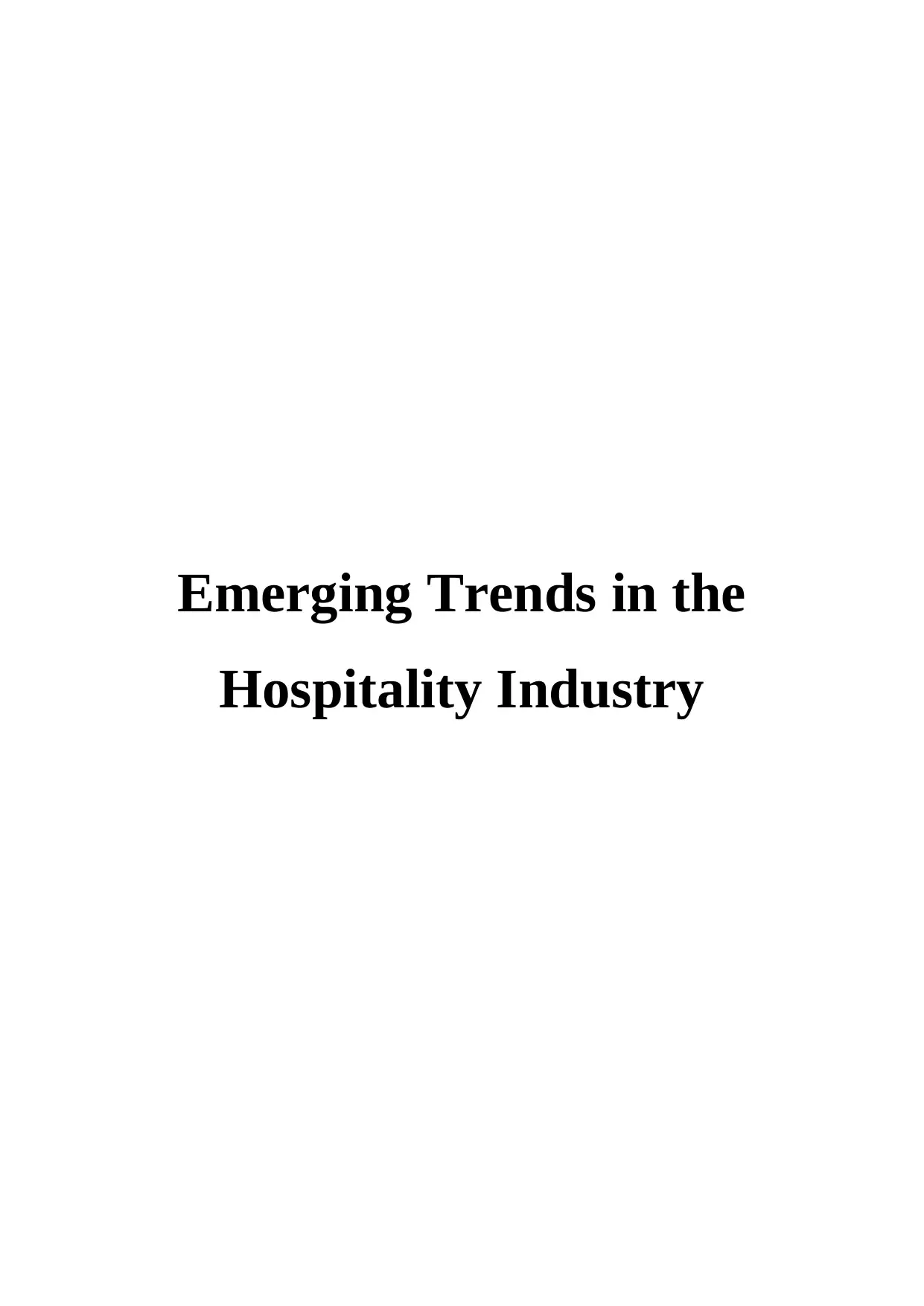
Emerging Trends in the
Hospitality Industry
Hospitality Industry
Paraphrase This Document
Need a fresh take? Get an instant paraphrase of this document with our AI Paraphraser
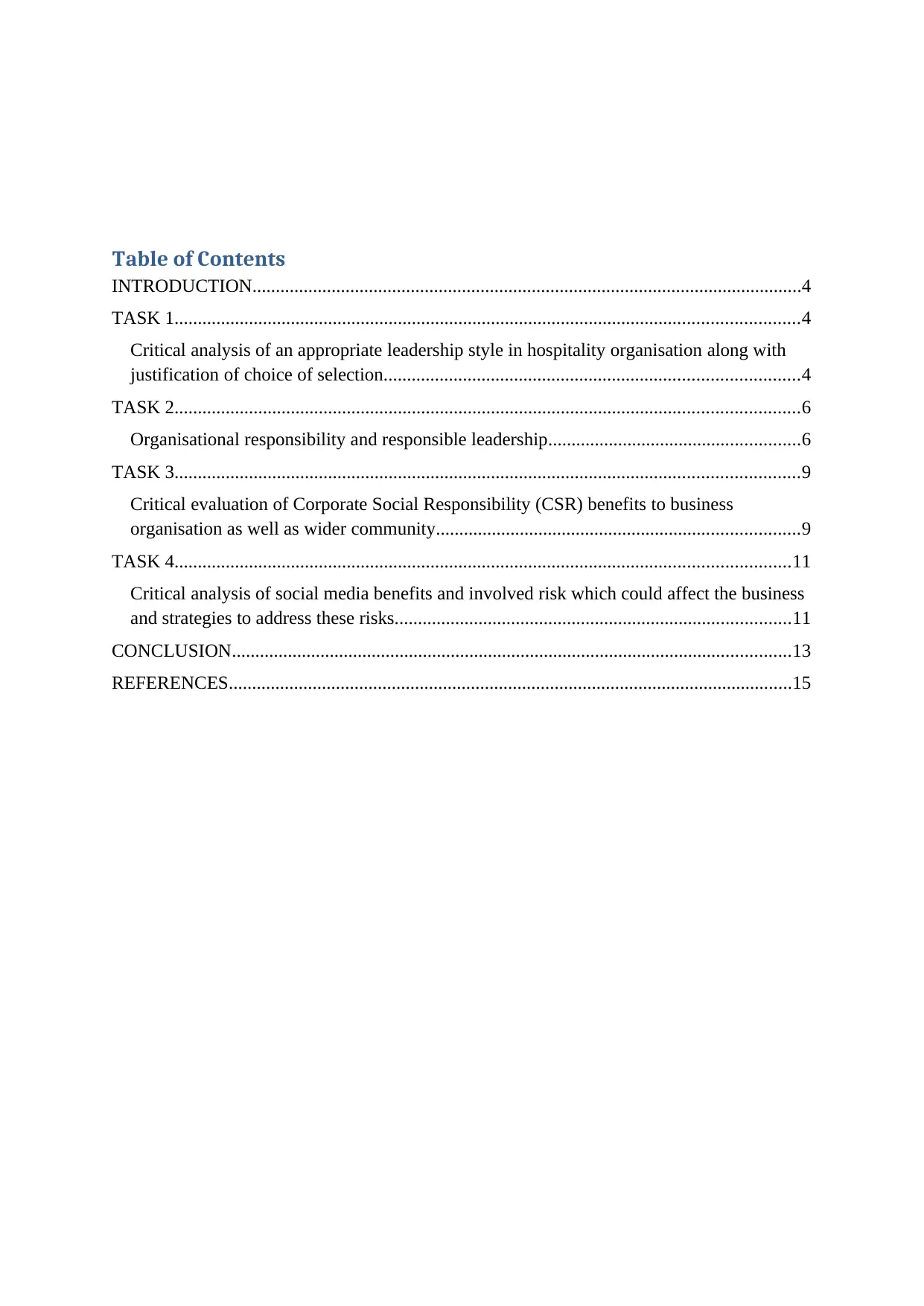
Table of Contents
INTRODUCTION......................................................................................................................4
TASK 1......................................................................................................................................4
Critical analysis of an appropriate leadership style in hospitality organisation along with
justification of choice of selection.........................................................................................4
TASK 2......................................................................................................................................6
Organisational responsibility and responsible leadership......................................................6
TASK 3......................................................................................................................................9
Critical evaluation of Corporate Social Responsibility (CSR) benefits to business
organisation as well as wider community..............................................................................9
TASK 4....................................................................................................................................11
Critical analysis of social media benefits and involved risk which could affect the business
and strategies to address these risks.....................................................................................11
CONCLUSION........................................................................................................................13
REFERENCES.........................................................................................................................15
INTRODUCTION......................................................................................................................4
TASK 1......................................................................................................................................4
Critical analysis of an appropriate leadership style in hospitality organisation along with
justification of choice of selection.........................................................................................4
TASK 2......................................................................................................................................6
Organisational responsibility and responsible leadership......................................................6
TASK 3......................................................................................................................................9
Critical evaluation of Corporate Social Responsibility (CSR) benefits to business
organisation as well as wider community..............................................................................9
TASK 4....................................................................................................................................11
Critical analysis of social media benefits and involved risk which could affect the business
and strategies to address these risks.....................................................................................11
CONCLUSION........................................................................................................................13
REFERENCES.........................................................................................................................15
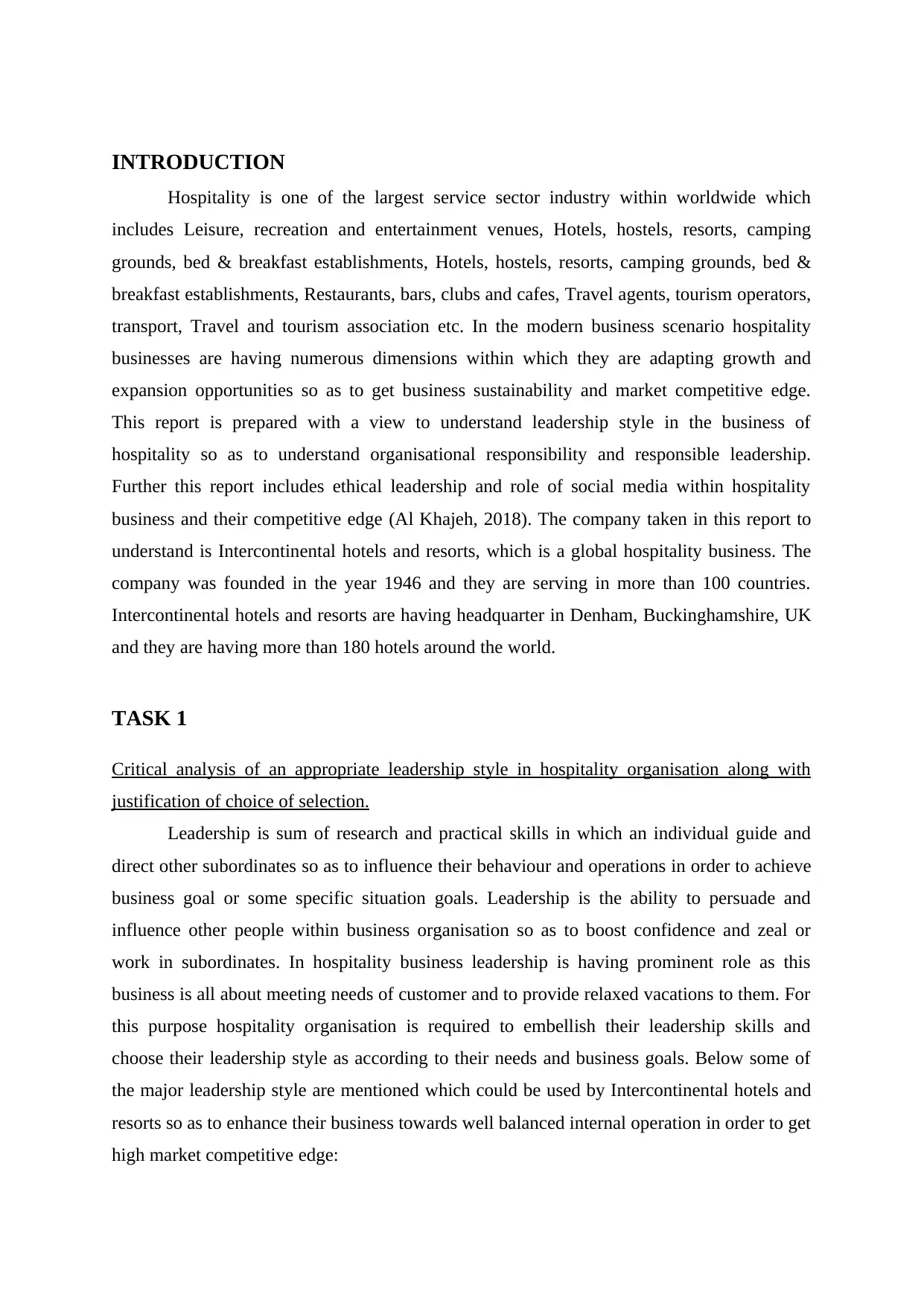
INTRODUCTION
Hospitality is one of the largest service sector industry within worldwide which
includes Leisure, recreation and entertainment venues, Hotels, hostels, resorts, camping
grounds, bed & breakfast establishments, Hotels, hostels, resorts, camping grounds, bed &
breakfast establishments, Restaurants, bars, clubs and cafes, Travel agents, tourism operators,
transport, Travel and tourism association etc. In the modern business scenario hospitality
businesses are having numerous dimensions within which they are adapting growth and
expansion opportunities so as to get business sustainability and market competitive edge.
This report is prepared with a view to understand leadership style in the business of
hospitality so as to understand organisational responsibility and responsible leadership.
Further this report includes ethical leadership and role of social media within hospitality
business and their competitive edge (Al Khajeh, 2018). The company taken in this report to
understand is Intercontinental hotels and resorts, which is a global hospitality business. The
company was founded in the year 1946 and they are serving in more than 100 countries.
Intercontinental hotels and resorts are having headquarter in Denham, Buckinghamshire, UK
and they are having more than 180 hotels around the world.
TASK 1
Critical analysis of an appropriate leadership style in hospitality organisation along with
justification of choice of selection.
Leadership is sum of research and practical skills in which an individual guide and
direct other subordinates so as to influence their behaviour and operations in order to achieve
business goal or some specific situation goals. Leadership is the ability to persuade and
influence other people within business organisation so as to boost confidence and zeal or
work in subordinates. In hospitality business leadership is having prominent role as this
business is all about meeting needs of customer and to provide relaxed vacations to them. For
this purpose hospitality organisation is required to embellish their leadership skills and
choose their leadership style as according to their needs and business goals. Below some of
the major leadership style are mentioned which could be used by Intercontinental hotels and
resorts so as to enhance their business towards well balanced internal operation in order to get
high market competitive edge:
Hospitality is one of the largest service sector industry within worldwide which
includes Leisure, recreation and entertainment venues, Hotels, hostels, resorts, camping
grounds, bed & breakfast establishments, Hotels, hostels, resorts, camping grounds, bed &
breakfast establishments, Restaurants, bars, clubs and cafes, Travel agents, tourism operators,
transport, Travel and tourism association etc. In the modern business scenario hospitality
businesses are having numerous dimensions within which they are adapting growth and
expansion opportunities so as to get business sustainability and market competitive edge.
This report is prepared with a view to understand leadership style in the business of
hospitality so as to understand organisational responsibility and responsible leadership.
Further this report includes ethical leadership and role of social media within hospitality
business and their competitive edge (Al Khajeh, 2018). The company taken in this report to
understand is Intercontinental hotels and resorts, which is a global hospitality business. The
company was founded in the year 1946 and they are serving in more than 100 countries.
Intercontinental hotels and resorts are having headquarter in Denham, Buckinghamshire, UK
and they are having more than 180 hotels around the world.
TASK 1
Critical analysis of an appropriate leadership style in hospitality organisation along with
justification of choice of selection.
Leadership is sum of research and practical skills in which an individual guide and
direct other subordinates so as to influence their behaviour and operations in order to achieve
business goal or some specific situation goals. Leadership is the ability to persuade and
influence other people within business organisation so as to boost confidence and zeal or
work in subordinates. In hospitality business leadership is having prominent role as this
business is all about meeting needs of customer and to provide relaxed vacations to them. For
this purpose hospitality organisation is required to embellish their leadership skills and
choose their leadership style as according to their needs and business goals. Below some of
the major leadership style are mentioned which could be used by Intercontinental hotels and
resorts so as to enhance their business towards well balanced internal operation in order to get
high market competitive edge:
⊘ This is a preview!⊘
Do you want full access?
Subscribe today to unlock all pages.

Trusted by 1+ million students worldwide
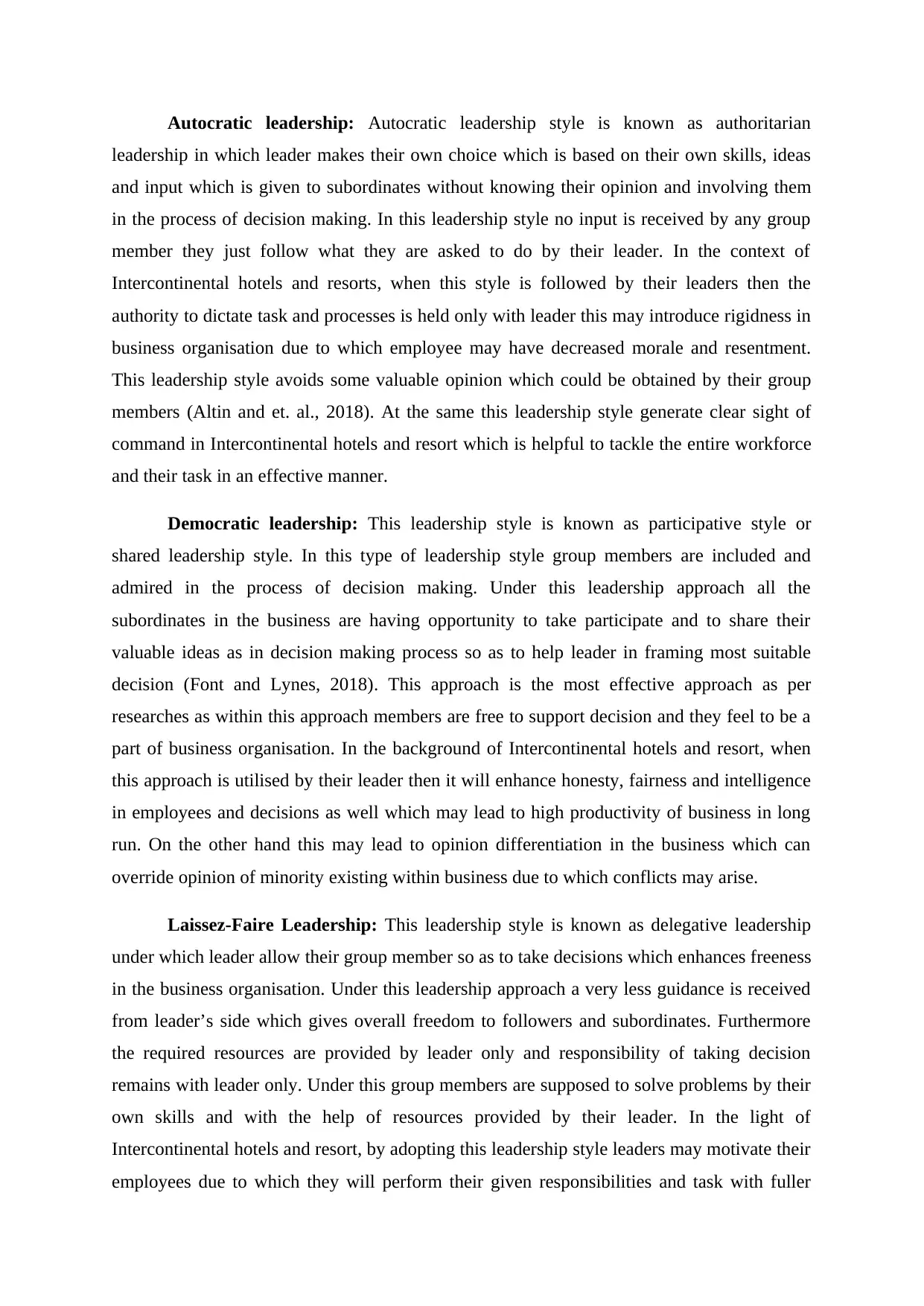
Autocratic leadership: Autocratic leadership style is known as authoritarian
leadership in which leader makes their own choice which is based on their own skills, ideas
and input which is given to subordinates without knowing their opinion and involving them
in the process of decision making. In this leadership style no input is received by any group
member they just follow what they are asked to do by their leader. In the context of
Intercontinental hotels and resorts, when this style is followed by their leaders then the
authority to dictate task and processes is held only with leader this may introduce rigidness in
business organisation due to which employee may have decreased morale and resentment.
This leadership style avoids some valuable opinion which could be obtained by their group
members (Altin and et. al., 2018). At the same this leadership style generate clear sight of
command in Intercontinental hotels and resort which is helpful to tackle the entire workforce
and their task in an effective manner.
Democratic leadership: This leadership style is known as participative style or
shared leadership style. In this type of leadership style group members are included and
admired in the process of decision making. Under this leadership approach all the
subordinates in the business are having opportunity to take participate and to share their
valuable ideas as in decision making process so as to help leader in framing most suitable
decision (Font and Lynes, 2018). This approach is the most effective approach as per
researches as within this approach members are free to support decision and they feel to be a
part of business organisation. In the background of Intercontinental hotels and resort, when
this approach is utilised by their leader then it will enhance honesty, fairness and intelligence
in employees and decisions as well which may lead to high productivity of business in long
run. On the other hand this may lead to opinion differentiation in the business which can
override opinion of minority existing within business due to which conflicts may arise.
Laissez-Faire Leadership: This leadership style is known as delegative leadership
under which leader allow their group member so as to take decisions which enhances freeness
in the business organisation. Under this leadership approach a very less guidance is received
from leader’s side which gives overall freedom to followers and subordinates. Furthermore
the required resources are provided by leader only and responsibility of taking decision
remains with leader only. Under this group members are supposed to solve problems by their
own skills and with the help of resources provided by their leader. In the light of
Intercontinental hotels and resort, by adopting this leadership style leaders may motivate their
employees due to which they will perform their given responsibilities and task with fuller
leadership in which leader makes their own choice which is based on their own skills, ideas
and input which is given to subordinates without knowing their opinion and involving them
in the process of decision making. In this leadership style no input is received by any group
member they just follow what they are asked to do by their leader. In the context of
Intercontinental hotels and resorts, when this style is followed by their leaders then the
authority to dictate task and processes is held only with leader this may introduce rigidness in
business organisation due to which employee may have decreased morale and resentment.
This leadership style avoids some valuable opinion which could be obtained by their group
members (Altin and et. al., 2018). At the same this leadership style generate clear sight of
command in Intercontinental hotels and resort which is helpful to tackle the entire workforce
and their task in an effective manner.
Democratic leadership: This leadership style is known as participative style or
shared leadership style. In this type of leadership style group members are included and
admired in the process of decision making. Under this leadership approach all the
subordinates in the business are having opportunity to take participate and to share their
valuable ideas as in decision making process so as to help leader in framing most suitable
decision (Font and Lynes, 2018). This approach is the most effective approach as per
researches as within this approach members are free to support decision and they feel to be a
part of business organisation. In the background of Intercontinental hotels and resort, when
this approach is utilised by their leader then it will enhance honesty, fairness and intelligence
in employees and decisions as well which may lead to high productivity of business in long
run. On the other hand this may lead to opinion differentiation in the business which can
override opinion of minority existing within business due to which conflicts may arise.
Laissez-Faire Leadership: This leadership style is known as delegative leadership
under which leader allow their group member so as to take decisions which enhances freeness
in the business organisation. Under this leadership approach a very less guidance is received
from leader’s side which gives overall freedom to followers and subordinates. Furthermore
the required resources are provided by leader only and responsibility of taking decision
remains with leader only. Under this group members are supposed to solve problems by their
own skills and with the help of resources provided by their leader. In the light of
Intercontinental hotels and resort, by adopting this leadership style leaders may motivate their
employees due to which they will perform their given responsibilities and task with fuller
Paraphrase This Document
Need a fresh take? Get an instant paraphrase of this document with our AI Paraphraser
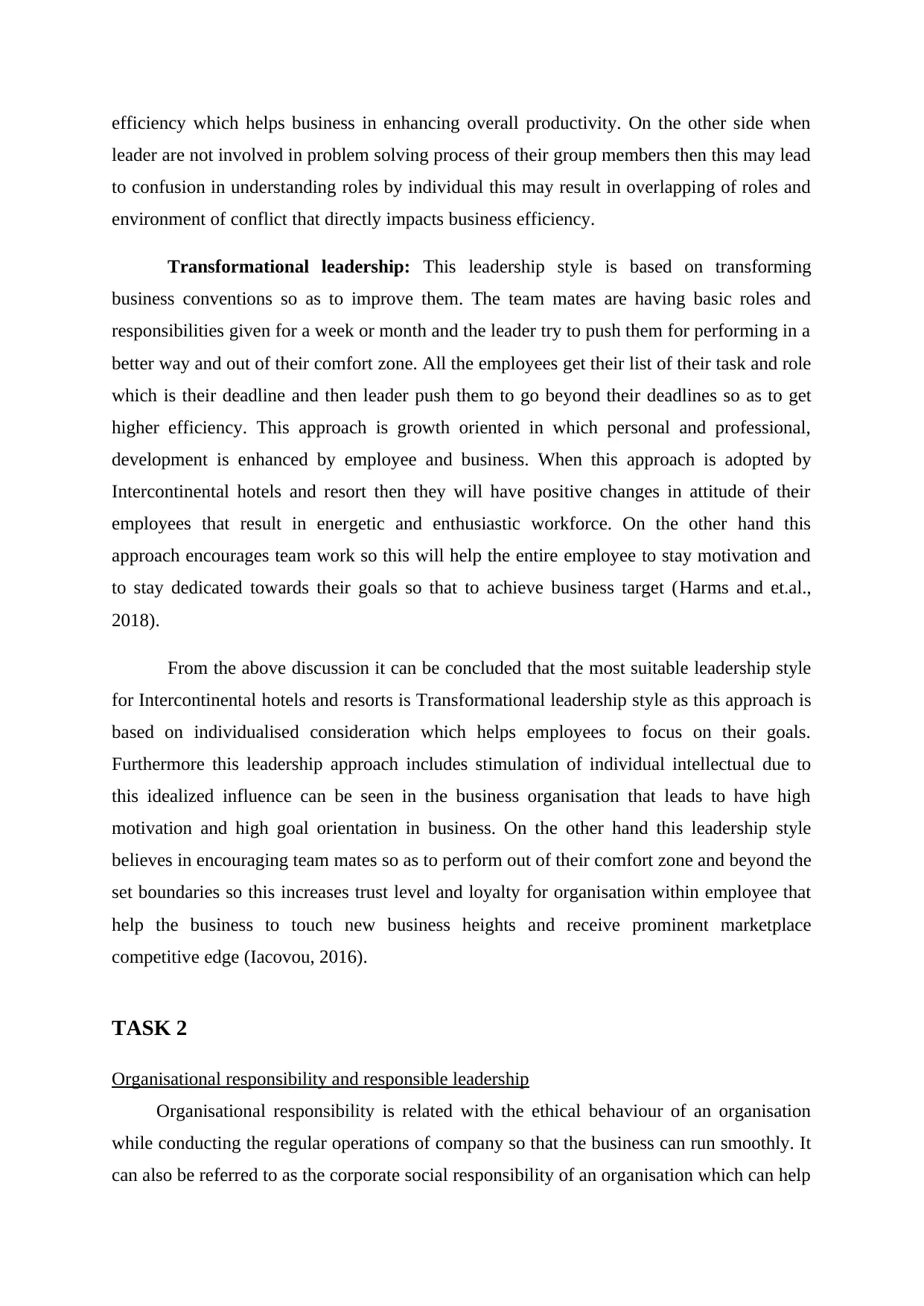
efficiency which helps business in enhancing overall productivity. On the other side when
leader are not involved in problem solving process of their group members then this may lead
to confusion in understanding roles by individual this may result in overlapping of roles and
environment of conflict that directly impacts business efficiency.
Transformational leadership: This leadership style is based on transforming
business conventions so as to improve them. The team mates are having basic roles and
responsibilities given for a week or month and the leader try to push them for performing in a
better way and out of their comfort zone. All the employees get their list of their task and role
which is their deadline and then leader push them to go beyond their deadlines so as to get
higher efficiency. This approach is growth oriented in which personal and professional,
development is enhanced by employee and business. When this approach is adopted by
Intercontinental hotels and resort then they will have positive changes in attitude of their
employees that result in energetic and enthusiastic workforce. On the other hand this
approach encourages team work so this will help the entire employee to stay motivation and
to stay dedicated towards their goals so that to achieve business target (Harms and et.al.,
2018).
From the above discussion it can be concluded that the most suitable leadership style
for Intercontinental hotels and resorts is Transformational leadership style as this approach is
based on individualised consideration which helps employees to focus on their goals.
Furthermore this leadership approach includes stimulation of individual intellectual due to
this idealized influence can be seen in the business organisation that leads to have high
motivation and high goal orientation in business. On the other hand this leadership style
believes in encouraging team mates so as to perform out of their comfort zone and beyond the
set boundaries so this increases trust level and loyalty for organisation within employee that
help the business to touch new business heights and receive prominent marketplace
competitive edge (Iacovou, 2016).
TASK 2
Organisational responsibility and responsible leadership
Organisational responsibility is related with the ethical behaviour of an organisation
while conducting the regular operations of company so that the business can run smoothly. It
can also be referred to as the corporate social responsibility of an organisation which can help
leader are not involved in problem solving process of their group members then this may lead
to confusion in understanding roles by individual this may result in overlapping of roles and
environment of conflict that directly impacts business efficiency.
Transformational leadership: This leadership style is based on transforming
business conventions so as to improve them. The team mates are having basic roles and
responsibilities given for a week or month and the leader try to push them for performing in a
better way and out of their comfort zone. All the employees get their list of their task and role
which is their deadline and then leader push them to go beyond their deadlines so as to get
higher efficiency. This approach is growth oriented in which personal and professional,
development is enhanced by employee and business. When this approach is adopted by
Intercontinental hotels and resort then they will have positive changes in attitude of their
employees that result in energetic and enthusiastic workforce. On the other hand this
approach encourages team work so this will help the entire employee to stay motivation and
to stay dedicated towards their goals so that to achieve business target (Harms and et.al.,
2018).
From the above discussion it can be concluded that the most suitable leadership style
for Intercontinental hotels and resorts is Transformational leadership style as this approach is
based on individualised consideration which helps employees to focus on their goals.
Furthermore this leadership approach includes stimulation of individual intellectual due to
this idealized influence can be seen in the business organisation that leads to have high
motivation and high goal orientation in business. On the other hand this leadership style
believes in encouraging team mates so as to perform out of their comfort zone and beyond the
set boundaries so this increases trust level and loyalty for organisation within employee that
help the business to touch new business heights and receive prominent marketplace
competitive edge (Iacovou, 2016).
TASK 2
Organisational responsibility and responsible leadership
Organisational responsibility is related with the ethical behaviour of an organisation
while conducting the regular operations of company so that the business can run smoothly. It
can also be referred to as the corporate social responsibility of an organisation which can help
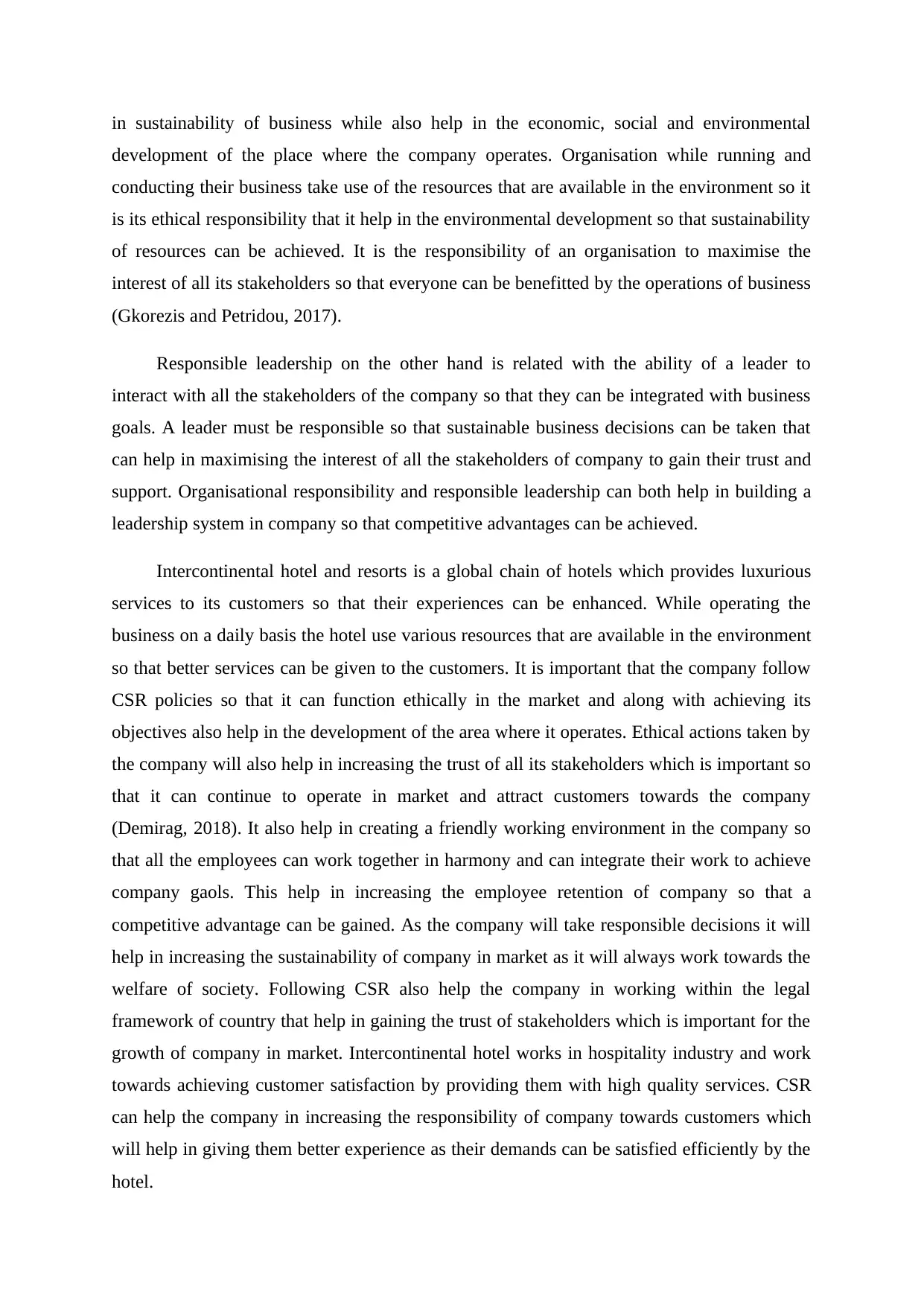
in sustainability of business while also help in the economic, social and environmental
development of the place where the company operates. Organisation while running and
conducting their business take use of the resources that are available in the environment so it
is its ethical responsibility that it help in the environmental development so that sustainability
of resources can be achieved. It is the responsibility of an organisation to maximise the
interest of all its stakeholders so that everyone can be benefitted by the operations of business
(Gkorezis and Petridou, 2017).
Responsible leadership on the other hand is related with the ability of a leader to
interact with all the stakeholders of the company so that they can be integrated with business
goals. A leader must be responsible so that sustainable business decisions can be taken that
can help in maximising the interest of all the stakeholders of company to gain their trust and
support. Organisational responsibility and responsible leadership can both help in building a
leadership system in company so that competitive advantages can be achieved.
Intercontinental hotel and resorts is a global chain of hotels which provides luxurious
services to its customers so that their experiences can be enhanced. While operating the
business on a daily basis the hotel use various resources that are available in the environment
so that better services can be given to the customers. It is important that the company follow
CSR policies so that it can function ethically in the market and along with achieving its
objectives also help in the development of the area where it operates. Ethical actions taken by
the company will also help in increasing the trust of all its stakeholders which is important so
that it can continue to operate in market and attract customers towards the company
(Demirag, 2018). It also help in creating a friendly working environment in the company so
that all the employees can work together in harmony and can integrate their work to achieve
company gaols. This help in increasing the employee retention of company so that a
competitive advantage can be gained. As the company will take responsible decisions it will
help in increasing the sustainability of company in market as it will always work towards the
welfare of society. Following CSR also help the company in working within the legal
framework of country that help in gaining the trust of stakeholders which is important for the
growth of company in market. Intercontinental hotel works in hospitality industry and work
towards achieving customer satisfaction by providing them with high quality services. CSR
can help the company in increasing the responsibility of company towards customers which
will help in giving them better experience as their demands can be satisfied efficiently by the
hotel.
development of the place where the company operates. Organisation while running and
conducting their business take use of the resources that are available in the environment so it
is its ethical responsibility that it help in the environmental development so that sustainability
of resources can be achieved. It is the responsibility of an organisation to maximise the
interest of all its stakeholders so that everyone can be benefitted by the operations of business
(Gkorezis and Petridou, 2017).
Responsible leadership on the other hand is related with the ability of a leader to
interact with all the stakeholders of the company so that they can be integrated with business
goals. A leader must be responsible so that sustainable business decisions can be taken that
can help in maximising the interest of all the stakeholders of company to gain their trust and
support. Organisational responsibility and responsible leadership can both help in building a
leadership system in company so that competitive advantages can be achieved.
Intercontinental hotel and resorts is a global chain of hotels which provides luxurious
services to its customers so that their experiences can be enhanced. While operating the
business on a daily basis the hotel use various resources that are available in the environment
so that better services can be given to the customers. It is important that the company follow
CSR policies so that it can function ethically in the market and along with achieving its
objectives also help in the development of the area where it operates. Ethical actions taken by
the company will also help in increasing the trust of all its stakeholders which is important so
that it can continue to operate in market and attract customers towards the company
(Demirag, 2018). It also help in creating a friendly working environment in the company so
that all the employees can work together in harmony and can integrate their work to achieve
company gaols. This help in increasing the employee retention of company so that a
competitive advantage can be gained. As the company will take responsible decisions it will
help in increasing the sustainability of company in market as it will always work towards the
welfare of society. Following CSR also help the company in working within the legal
framework of country that help in gaining the trust of stakeholders which is important for the
growth of company in market. Intercontinental hotel works in hospitality industry and work
towards achieving customer satisfaction by providing them with high quality services. CSR
can help the company in increasing the responsibility of company towards customers which
will help in giving them better experience as their demands can be satisfied efficiently by the
hotel.
⊘ This is a preview!⊘
Do you want full access?
Subscribe today to unlock all pages.

Trusted by 1+ million students worldwide
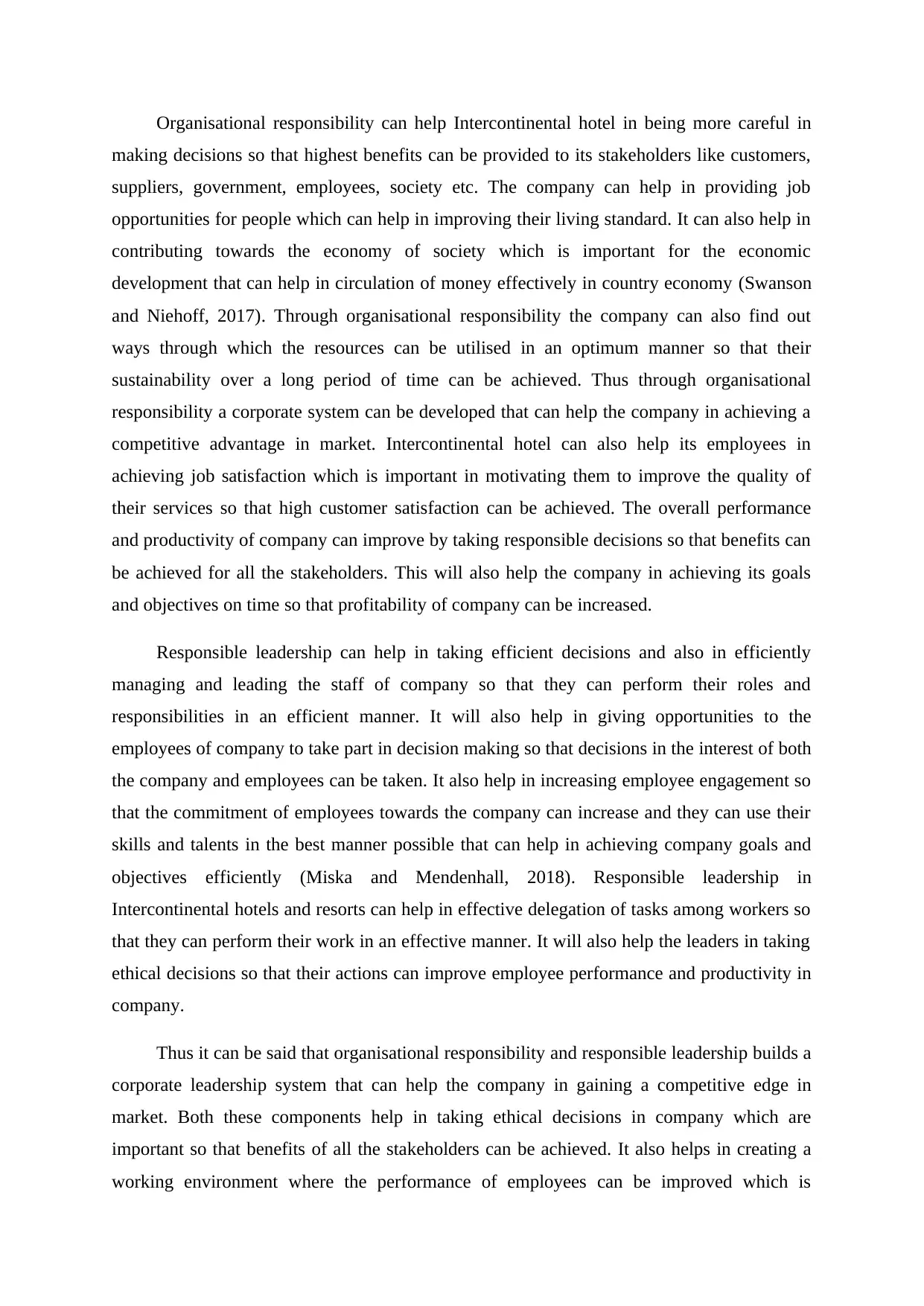
Organisational responsibility can help Intercontinental hotel in being more careful in
making decisions so that highest benefits can be provided to its stakeholders like customers,
suppliers, government, employees, society etc. The company can help in providing job
opportunities for people which can help in improving their living standard. It can also help in
contributing towards the economy of society which is important for the economic
development that can help in circulation of money effectively in country economy (Swanson
and Niehoff, 2017). Through organisational responsibility the company can also find out
ways through which the resources can be utilised in an optimum manner so that their
sustainability over a long period of time can be achieved. Thus through organisational
responsibility a corporate system can be developed that can help the company in achieving a
competitive advantage in market. Intercontinental hotel can also help its employees in
achieving job satisfaction which is important in motivating them to improve the quality of
their services so that high customer satisfaction can be achieved. The overall performance
and productivity of company can improve by taking responsible decisions so that benefits can
be achieved for all the stakeholders. This will also help the company in achieving its goals
and objectives on time so that profitability of company can be increased.
Responsible leadership can help in taking efficient decisions and also in efficiently
managing and leading the staff of company so that they can perform their roles and
responsibilities in an efficient manner. It will also help in giving opportunities to the
employees of company to take part in decision making so that decisions in the interest of both
the company and employees can be taken. It also help in increasing employee engagement so
that the commitment of employees towards the company can increase and they can use their
skills and talents in the best manner possible that can help in achieving company goals and
objectives efficiently (Miska and Mendenhall, 2018). Responsible leadership in
Intercontinental hotels and resorts can help in effective delegation of tasks among workers so
that they can perform their work in an effective manner. It will also help the leaders in taking
ethical decisions so that their actions can improve employee performance and productivity in
company.
Thus it can be said that organisational responsibility and responsible leadership builds a
corporate leadership system that can help the company in gaining a competitive edge in
market. Both these components help in taking ethical decisions in company which are
important so that benefits of all the stakeholders can be achieved. It also helps in creating a
working environment where the performance of employees can be improved which is
making decisions so that highest benefits can be provided to its stakeholders like customers,
suppliers, government, employees, society etc. The company can help in providing job
opportunities for people which can help in improving their living standard. It can also help in
contributing towards the economy of society which is important for the economic
development that can help in circulation of money effectively in country economy (Swanson
and Niehoff, 2017). Through organisational responsibility the company can also find out
ways through which the resources can be utilised in an optimum manner so that their
sustainability over a long period of time can be achieved. Thus through organisational
responsibility a corporate system can be developed that can help the company in achieving a
competitive advantage in market. Intercontinental hotel can also help its employees in
achieving job satisfaction which is important in motivating them to improve the quality of
their services so that high customer satisfaction can be achieved. The overall performance
and productivity of company can improve by taking responsible decisions so that benefits can
be achieved for all the stakeholders. This will also help the company in achieving its goals
and objectives on time so that profitability of company can be increased.
Responsible leadership can help in taking efficient decisions and also in efficiently
managing and leading the staff of company so that they can perform their roles and
responsibilities in an efficient manner. It will also help in giving opportunities to the
employees of company to take part in decision making so that decisions in the interest of both
the company and employees can be taken. It also help in increasing employee engagement so
that the commitment of employees towards the company can increase and they can use their
skills and talents in the best manner possible that can help in achieving company goals and
objectives efficiently (Miska and Mendenhall, 2018). Responsible leadership in
Intercontinental hotels and resorts can help in effective delegation of tasks among workers so
that they can perform their work in an effective manner. It will also help the leaders in taking
ethical decisions so that their actions can improve employee performance and productivity in
company.
Thus it can be said that organisational responsibility and responsible leadership builds a
corporate leadership system that can help the company in gaining a competitive edge in
market. Both these components help in taking ethical decisions in company which are
important so that benefits of all the stakeholders can be achieved. It also helps in creating a
working environment where the performance of employees can be improved which is
Paraphrase This Document
Need a fresh take? Get an instant paraphrase of this document with our AI Paraphraser
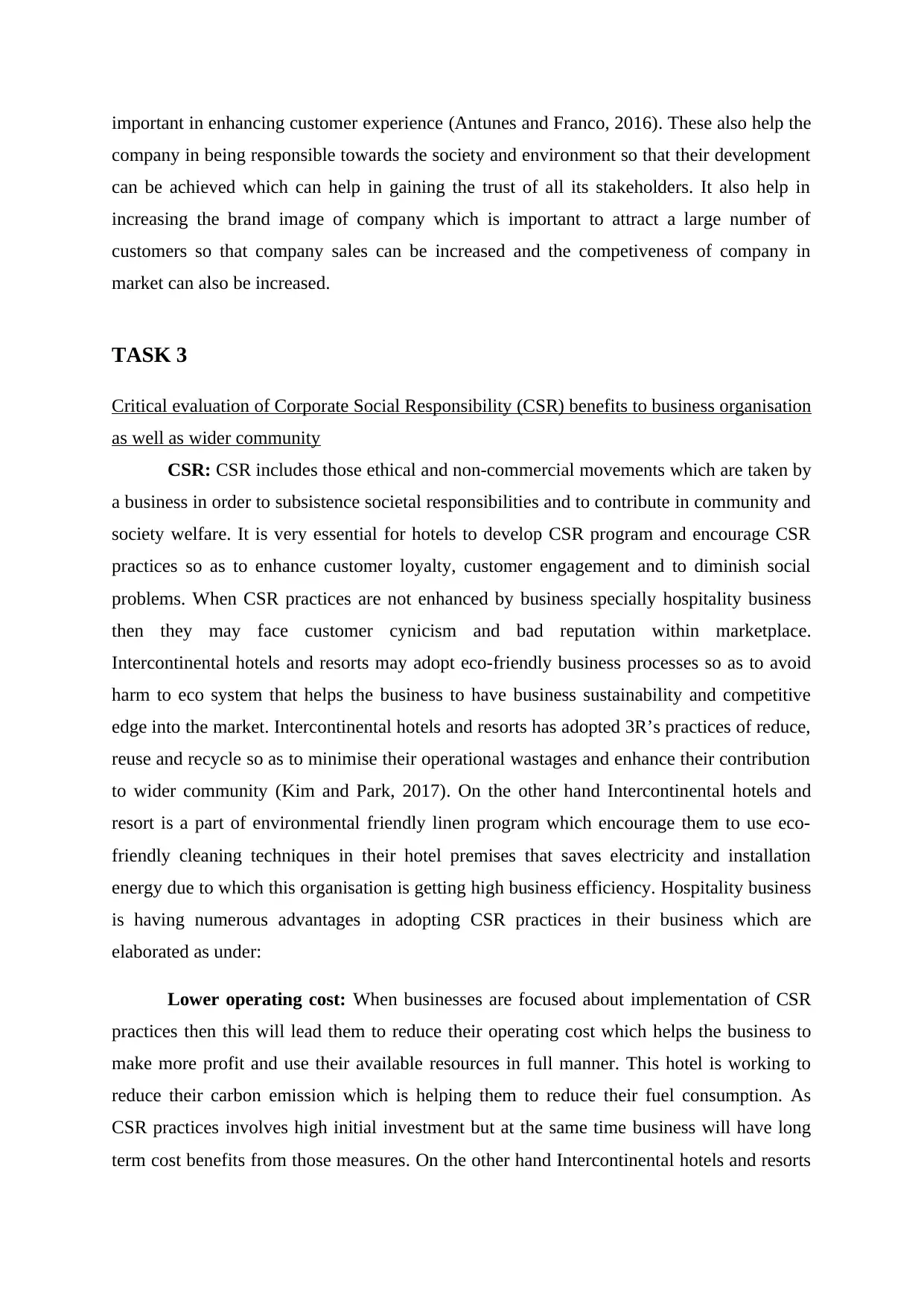
important in enhancing customer experience (Antunes and Franco, 2016). These also help the
company in being responsible towards the society and environment so that their development
can be achieved which can help in gaining the trust of all its stakeholders. It also help in
increasing the brand image of company which is important to attract a large number of
customers so that company sales can be increased and the competiveness of company in
market can also be increased.
TASK 3
Critical evaluation of Corporate Social Responsibility (CSR) benefits to business organisation
as well as wider community
CSR: CSR includes those ethical and non-commercial movements which are taken by
a business in order to subsistence societal responsibilities and to contribute in community and
society welfare. It is very essential for hotels to develop CSR program and encourage CSR
practices so as to enhance customer loyalty, customer engagement and to diminish social
problems. When CSR practices are not enhanced by business specially hospitality business
then they may face customer cynicism and bad reputation within marketplace.
Intercontinental hotels and resorts may adopt eco-friendly business processes so as to avoid
harm to eco system that helps the business to have business sustainability and competitive
edge into the market. Intercontinental hotels and resorts has adopted 3R’s practices of reduce,
reuse and recycle so as to minimise their operational wastages and enhance their contribution
to wider community (Kim and Park, 2017). On the other hand Intercontinental hotels and
resort is a part of environmental friendly linen program which encourage them to use eco-
friendly cleaning techniques in their hotel premises that saves electricity and installation
energy due to which this organisation is getting high business efficiency. Hospitality business
is having numerous advantages in adopting CSR practices in their business which are
elaborated as under:
Lower operating cost: When businesses are focused about implementation of CSR
practices then this will lead them to reduce their operating cost which helps the business to
make more profit and use their available resources in full manner. This hotel is working to
reduce their carbon emission which is helping them to reduce their fuel consumption. As
CSR practices involves high initial investment but at the same time business will have long
term cost benefits from those measures. On the other hand Intercontinental hotels and resorts
company in being responsible towards the society and environment so that their development
can be achieved which can help in gaining the trust of all its stakeholders. It also help in
increasing the brand image of company which is important to attract a large number of
customers so that company sales can be increased and the competiveness of company in
market can also be increased.
TASK 3
Critical evaluation of Corporate Social Responsibility (CSR) benefits to business organisation
as well as wider community
CSR: CSR includes those ethical and non-commercial movements which are taken by
a business in order to subsistence societal responsibilities and to contribute in community and
society welfare. It is very essential for hotels to develop CSR program and encourage CSR
practices so as to enhance customer loyalty, customer engagement and to diminish social
problems. When CSR practices are not enhanced by business specially hospitality business
then they may face customer cynicism and bad reputation within marketplace.
Intercontinental hotels and resorts may adopt eco-friendly business processes so as to avoid
harm to eco system that helps the business to have business sustainability and competitive
edge into the market. Intercontinental hotels and resorts has adopted 3R’s practices of reduce,
reuse and recycle so as to minimise their operational wastages and enhance their contribution
to wider community (Kim and Park, 2017). On the other hand Intercontinental hotels and
resort is a part of environmental friendly linen program which encourage them to use eco-
friendly cleaning techniques in their hotel premises that saves electricity and installation
energy due to which this organisation is getting high business efficiency. Hospitality business
is having numerous advantages in adopting CSR practices in their business which are
elaborated as under:
Lower operating cost: When businesses are focused about implementation of CSR
practices then this will lead them to reduce their operating cost which helps the business to
make more profit and use their available resources in full manner. This hotel is working to
reduce their carbon emission which is helping them to reduce their fuel consumption. As
CSR practices involves high initial investment but at the same time business will have long
term cost benefits from those measures. On the other hand Intercontinental hotels and resorts
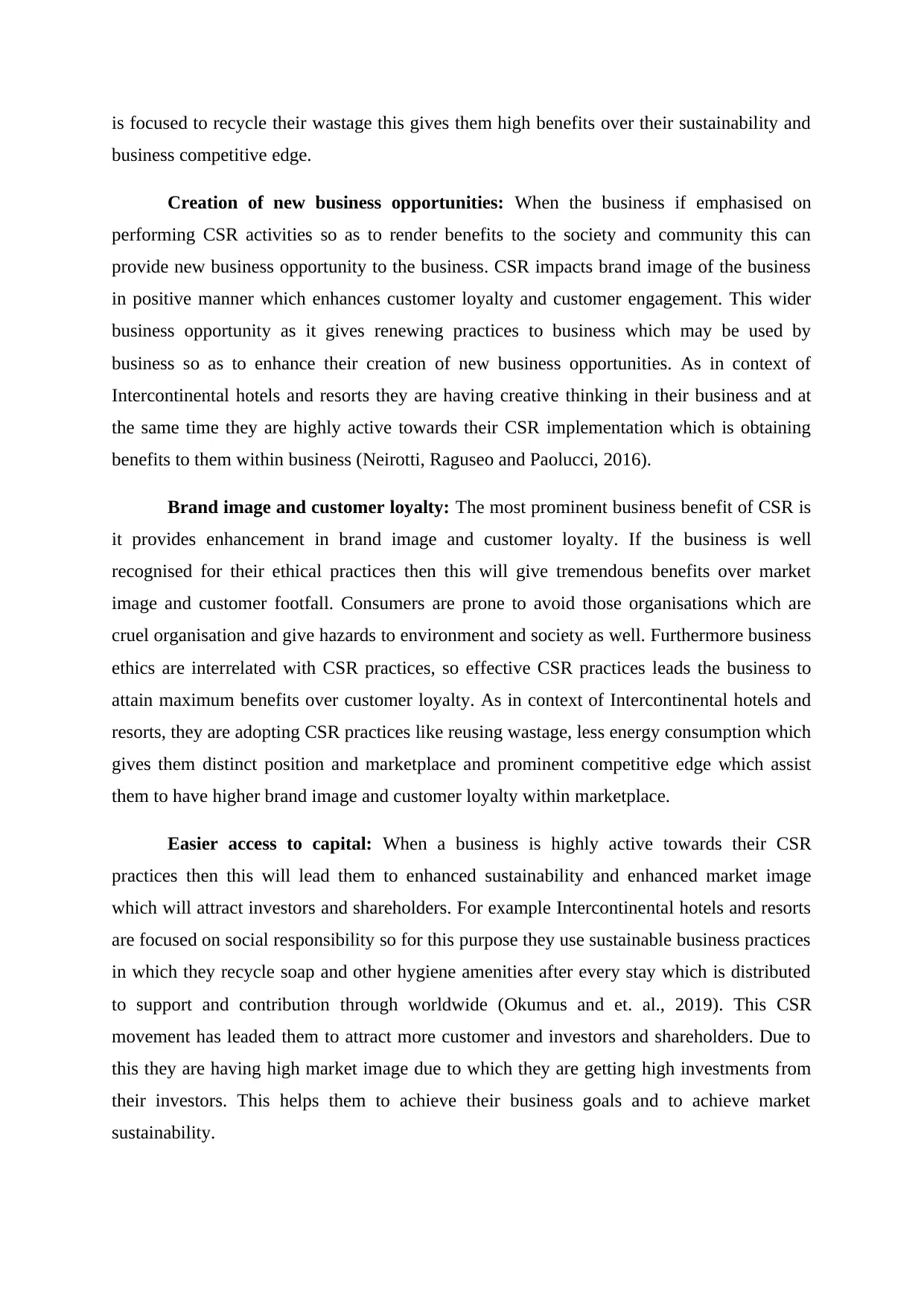
is focused to recycle their wastage this gives them high benefits over their sustainability and
business competitive edge.
Creation of new business opportunities: When the business if emphasised on
performing CSR activities so as to render benefits to the society and community this can
provide new business opportunity to the business. CSR impacts brand image of the business
in positive manner which enhances customer loyalty and customer engagement. This wider
business opportunity as it gives renewing practices to business which may be used by
business so as to enhance their creation of new business opportunities. As in context of
Intercontinental hotels and resorts they are having creative thinking in their business and at
the same time they are highly active towards their CSR implementation which is obtaining
benefits to them within business (Neirotti, Raguseo and Paolucci, 2016).
Brand image and customer loyalty: The most prominent business benefit of CSR is
it provides enhancement in brand image and customer loyalty. If the business is well
recognised for their ethical practices then this will give tremendous benefits over market
image and customer footfall. Consumers are prone to avoid those organisations which are
cruel organisation and give hazards to environment and society as well. Furthermore business
ethics are interrelated with CSR practices, so effective CSR practices leads the business to
attain maximum benefits over customer loyalty. As in context of Intercontinental hotels and
resorts, they are adopting CSR practices like reusing wastage, less energy consumption which
gives them distinct position and marketplace and prominent competitive edge which assist
them to have higher brand image and customer loyalty within marketplace.
Easier access to capital: When a business is highly active towards their CSR
practices then this will lead them to enhanced sustainability and enhanced market image
which will attract investors and shareholders. For example Intercontinental hotels and resorts
are focused on social responsibility so for this purpose they use sustainable business practices
in which they recycle soap and other hygiene amenities after every stay which is distributed
to support and contribution through worldwide (Okumus and et. al., 2019). This CSR
movement has leaded them to attract more customer and investors and shareholders. Due to
this they are having high market image due to which they are getting high investments from
their investors. This helps them to achieve their business goals and to achieve market
sustainability.
business competitive edge.
Creation of new business opportunities: When the business if emphasised on
performing CSR activities so as to render benefits to the society and community this can
provide new business opportunity to the business. CSR impacts brand image of the business
in positive manner which enhances customer loyalty and customer engagement. This wider
business opportunity as it gives renewing practices to business which may be used by
business so as to enhance their creation of new business opportunities. As in context of
Intercontinental hotels and resorts they are having creative thinking in their business and at
the same time they are highly active towards their CSR implementation which is obtaining
benefits to them within business (Neirotti, Raguseo and Paolucci, 2016).
Brand image and customer loyalty: The most prominent business benefit of CSR is
it provides enhancement in brand image and customer loyalty. If the business is well
recognised for their ethical practices then this will give tremendous benefits over market
image and customer footfall. Consumers are prone to avoid those organisations which are
cruel organisation and give hazards to environment and society as well. Furthermore business
ethics are interrelated with CSR practices, so effective CSR practices leads the business to
attain maximum benefits over customer loyalty. As in context of Intercontinental hotels and
resorts, they are adopting CSR practices like reusing wastage, less energy consumption which
gives them distinct position and marketplace and prominent competitive edge which assist
them to have higher brand image and customer loyalty within marketplace.
Easier access to capital: When a business is highly active towards their CSR
practices then this will lead them to enhanced sustainability and enhanced market image
which will attract investors and shareholders. For example Intercontinental hotels and resorts
are focused on social responsibility so for this purpose they use sustainable business practices
in which they recycle soap and other hygiene amenities after every stay which is distributed
to support and contribution through worldwide (Okumus and et. al., 2019). This CSR
movement has leaded them to attract more customer and investors and shareholders. Due to
this they are having high market image due to which they are getting high investments from
their investors. This helps them to achieve their business goals and to achieve market
sustainability.
⊘ This is a preview!⊘
Do you want full access?
Subscribe today to unlock all pages.

Trusted by 1+ million students worldwide
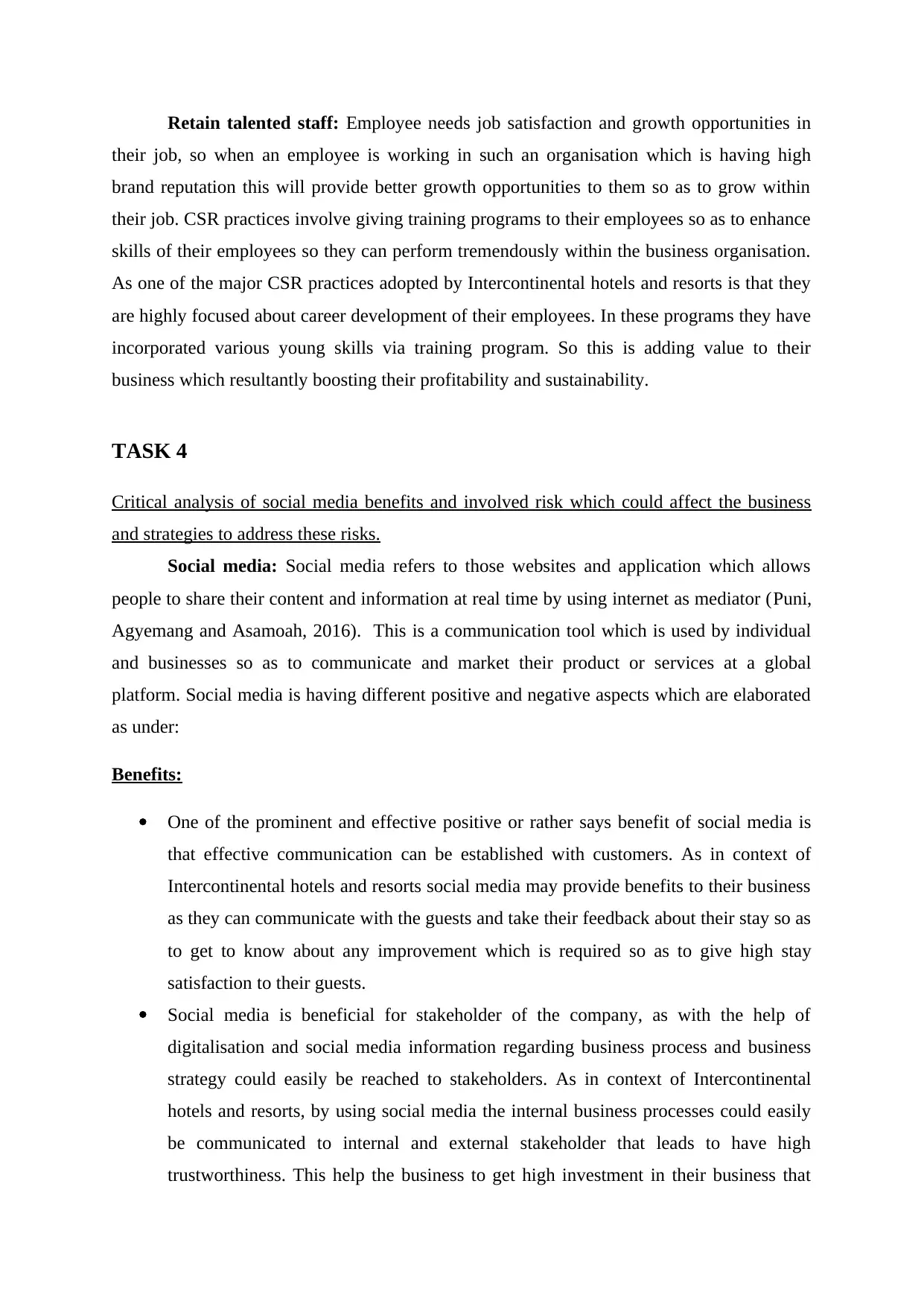
Retain talented staff: Employee needs job satisfaction and growth opportunities in
their job, so when an employee is working in such an organisation which is having high
brand reputation this will provide better growth opportunities to them so as to grow within
their job. CSR practices involve giving training programs to their employees so as to enhance
skills of their employees so they can perform tremendously within the business organisation.
As one of the major CSR practices adopted by Intercontinental hotels and resorts is that they
are highly focused about career development of their employees. In these programs they have
incorporated various young skills via training program. So this is adding value to their
business which resultantly boosting their profitability and sustainability.
TASK 4
Critical analysis of social media benefits and involved risk which could affect the business
and strategies to address these risks.
Social media: Social media refers to those websites and application which allows
people to share their content and information at real time by using internet as mediator (Puni,
Agyemang and Asamoah, 2016). This is a communication tool which is used by individual
and businesses so as to communicate and market their product or services at a global
platform. Social media is having different positive and negative aspects which are elaborated
as under:
Benefits:
One of the prominent and effective positive or rather says benefit of social media is
that effective communication can be established with customers. As in context of
Intercontinental hotels and resorts social media may provide benefits to their business
as they can communicate with the guests and take their feedback about their stay so as
to get to know about any improvement which is required so as to give high stay
satisfaction to their guests.
Social media is beneficial for stakeholder of the company, as with the help of
digitalisation and social media information regarding business process and business
strategy could easily be reached to stakeholders. As in context of Intercontinental
hotels and resorts, by using social media the internal business processes could easily
be communicated to internal and external stakeholder that leads to have high
trustworthiness. This help the business to get high investment in their business that
their job, so when an employee is working in such an organisation which is having high
brand reputation this will provide better growth opportunities to them so as to grow within
their job. CSR practices involve giving training programs to their employees so as to enhance
skills of their employees so they can perform tremendously within the business organisation.
As one of the major CSR practices adopted by Intercontinental hotels and resorts is that they
are highly focused about career development of their employees. In these programs they have
incorporated various young skills via training program. So this is adding value to their
business which resultantly boosting their profitability and sustainability.
TASK 4
Critical analysis of social media benefits and involved risk which could affect the business
and strategies to address these risks.
Social media: Social media refers to those websites and application which allows
people to share their content and information at real time by using internet as mediator (Puni,
Agyemang and Asamoah, 2016). This is a communication tool which is used by individual
and businesses so as to communicate and market their product or services at a global
platform. Social media is having different positive and negative aspects which are elaborated
as under:
Benefits:
One of the prominent and effective positive or rather says benefit of social media is
that effective communication can be established with customers. As in context of
Intercontinental hotels and resorts social media may provide benefits to their business
as they can communicate with the guests and take their feedback about their stay so as
to get to know about any improvement which is required so as to give high stay
satisfaction to their guests.
Social media is beneficial for stakeholder of the company, as with the help of
digitalisation and social media information regarding business process and business
strategy could easily be reached to stakeholders. As in context of Intercontinental
hotels and resorts, by using social media the internal business processes could easily
be communicated to internal and external stakeholder that leads to have high
trustworthiness. This help the business to get high investment in their business that
Paraphrase This Document
Need a fresh take? Get an instant paraphrase of this document with our AI Paraphraser
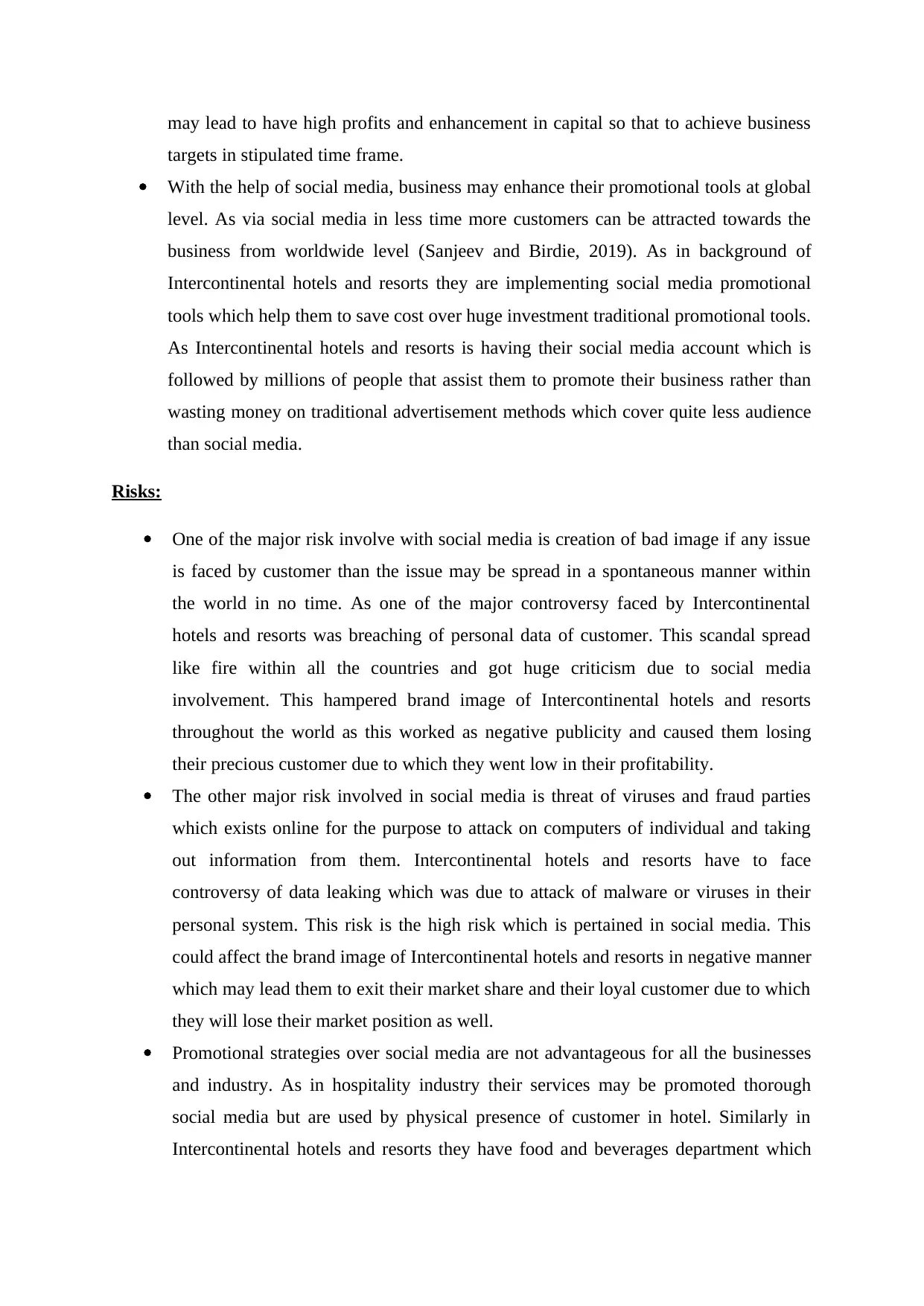
may lead to have high profits and enhancement in capital so that to achieve business
targets in stipulated time frame.
With the help of social media, business may enhance their promotional tools at global
level. As via social media in less time more customers can be attracted towards the
business from worldwide level (Sanjeev and Birdie, 2019). As in background of
Intercontinental hotels and resorts they are implementing social media promotional
tools which help them to save cost over huge investment traditional promotional tools.
As Intercontinental hotels and resorts is having their social media account which is
followed by millions of people that assist them to promote their business rather than
wasting money on traditional advertisement methods which cover quite less audience
than social media.
Risks:
One of the major risk involve with social media is creation of bad image if any issue
is faced by customer than the issue may be spread in a spontaneous manner within
the world in no time. As one of the major controversy faced by Intercontinental
hotels and resorts was breaching of personal data of customer. This scandal spread
like fire within all the countries and got huge criticism due to social media
involvement. This hampered brand image of Intercontinental hotels and resorts
throughout the world as this worked as negative publicity and caused them losing
their precious customer due to which they went low in their profitability.
The other major risk involved in social media is threat of viruses and fraud parties
which exists online for the purpose to attack on computers of individual and taking
out information from them. Intercontinental hotels and resorts have to face
controversy of data leaking which was due to attack of malware or viruses in their
personal system. This risk is the high risk which is pertained in social media. This
could affect the brand image of Intercontinental hotels and resorts in negative manner
which may lead them to exit their market share and their loyal customer due to which
they will lose their market position as well.
Promotional strategies over social media are not advantageous for all the businesses
and industry. As in hospitality industry their services may be promoted thorough
social media but are used by physical presence of customer in hotel. Similarly in
Intercontinental hotels and resorts they have food and beverages department which
targets in stipulated time frame.
With the help of social media, business may enhance their promotional tools at global
level. As via social media in less time more customers can be attracted towards the
business from worldwide level (Sanjeev and Birdie, 2019). As in background of
Intercontinental hotels and resorts they are implementing social media promotional
tools which help them to save cost over huge investment traditional promotional tools.
As Intercontinental hotels and resorts is having their social media account which is
followed by millions of people that assist them to promote their business rather than
wasting money on traditional advertisement methods which cover quite less audience
than social media.
Risks:
One of the major risk involve with social media is creation of bad image if any issue
is faced by customer than the issue may be spread in a spontaneous manner within
the world in no time. As one of the major controversy faced by Intercontinental
hotels and resorts was breaching of personal data of customer. This scandal spread
like fire within all the countries and got huge criticism due to social media
involvement. This hampered brand image of Intercontinental hotels and resorts
throughout the world as this worked as negative publicity and caused them losing
their precious customer due to which they went low in their profitability.
The other major risk involved in social media is threat of viruses and fraud parties
which exists online for the purpose to attack on computers of individual and taking
out information from them. Intercontinental hotels and resorts have to face
controversy of data leaking which was due to attack of malware or viruses in their
personal system. This risk is the high risk which is pertained in social media. This
could affect the brand image of Intercontinental hotels and resorts in negative manner
which may lead them to exit their market share and their loyal customer due to which
they will lose their market position as well.
Promotional strategies over social media are not advantageous for all the businesses
and industry. As in hospitality industry their services may be promoted thorough
social media but are used by physical presence of customer in hotel. Similarly in
Intercontinental hotels and resorts they have food and beverages department which
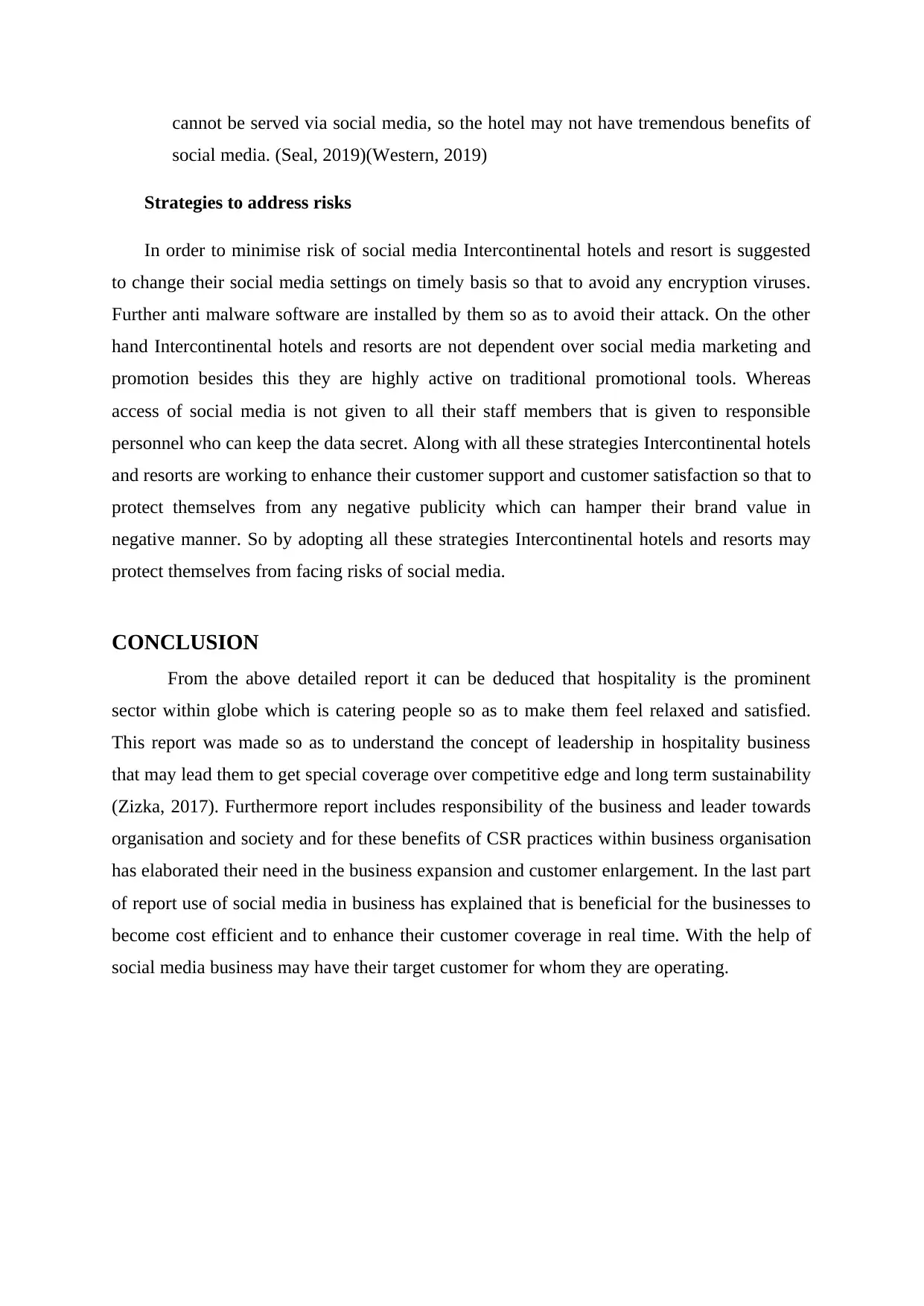
cannot be served via social media, so the hotel may not have tremendous benefits of
social media. (Seal, 2019)(Western, 2019)
Strategies to address risks
In order to minimise risk of social media Intercontinental hotels and resort is suggested
to change their social media settings on timely basis so that to avoid any encryption viruses.
Further anti malware software are installed by them so as to avoid their attack. On the other
hand Intercontinental hotels and resorts are not dependent over social media marketing and
promotion besides this they are highly active on traditional promotional tools. Whereas
access of social media is not given to all their staff members that is given to responsible
personnel who can keep the data secret. Along with all these strategies Intercontinental hotels
and resorts are working to enhance their customer support and customer satisfaction so that to
protect themselves from any negative publicity which can hamper their brand value in
negative manner. So by adopting all these strategies Intercontinental hotels and resorts may
protect themselves from facing risks of social media.
CONCLUSION
From the above detailed report it can be deduced that hospitality is the prominent
sector within globe which is catering people so as to make them feel relaxed and satisfied.
This report was made so as to understand the concept of leadership in hospitality business
that may lead them to get special coverage over competitive edge and long term sustainability
(Zizka, 2017). Furthermore report includes responsibility of the business and leader towards
organisation and society and for these benefits of CSR practices within business organisation
has elaborated their need in the business expansion and customer enlargement. In the last part
of report use of social media in business has explained that is beneficial for the businesses to
become cost efficient and to enhance their customer coverage in real time. With the help of
social media business may have their target customer for whom they are operating.
social media. (Seal, 2019)(Western, 2019)
Strategies to address risks
In order to minimise risk of social media Intercontinental hotels and resort is suggested
to change their social media settings on timely basis so that to avoid any encryption viruses.
Further anti malware software are installed by them so as to avoid their attack. On the other
hand Intercontinental hotels and resorts are not dependent over social media marketing and
promotion besides this they are highly active on traditional promotional tools. Whereas
access of social media is not given to all their staff members that is given to responsible
personnel who can keep the data secret. Along with all these strategies Intercontinental hotels
and resorts are working to enhance their customer support and customer satisfaction so that to
protect themselves from any negative publicity which can hamper their brand value in
negative manner. So by adopting all these strategies Intercontinental hotels and resorts may
protect themselves from facing risks of social media.
CONCLUSION
From the above detailed report it can be deduced that hospitality is the prominent
sector within globe which is catering people so as to make them feel relaxed and satisfied.
This report was made so as to understand the concept of leadership in hospitality business
that may lead them to get special coverage over competitive edge and long term sustainability
(Zizka, 2017). Furthermore report includes responsibility of the business and leader towards
organisation and society and for these benefits of CSR practices within business organisation
has elaborated their need in the business expansion and customer enlargement. In the last part
of report use of social media in business has explained that is beneficial for the businesses to
become cost efficient and to enhance their customer coverage in real time. With the help of
social media business may have their target customer for whom they are operating.
⊘ This is a preview!⊘
Do you want full access?
Subscribe today to unlock all pages.

Trusted by 1+ million students worldwide
1 out of 14
Related Documents
Your All-in-One AI-Powered Toolkit for Academic Success.
+13062052269
info@desklib.com
Available 24*7 on WhatsApp / Email
![[object Object]](/_next/static/media/star-bottom.7253800d.svg)
Unlock your academic potential
Copyright © 2020–2026 A2Z Services. All Rights Reserved. Developed and managed by ZUCOL.





